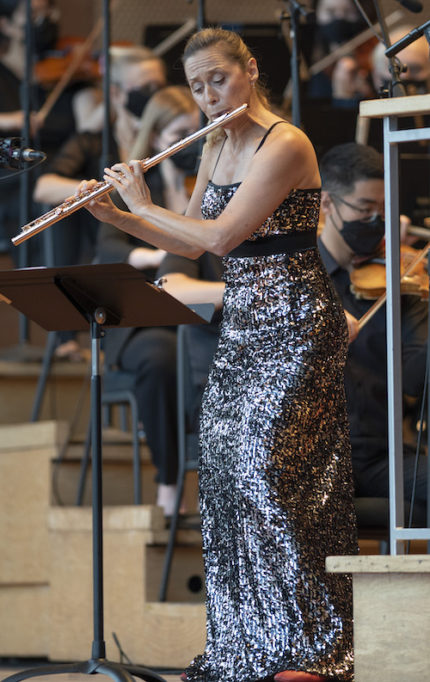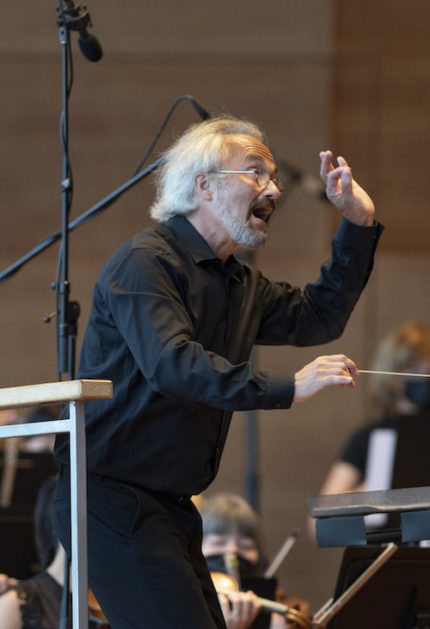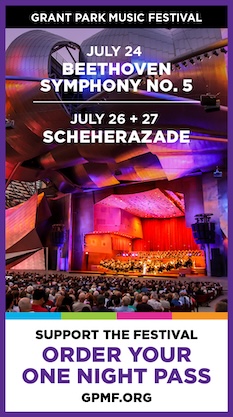Piccinini, GPO give stellar advocacy to premiere of Theofanidis Flute Concerto

Wednesday night’s Grant Park Orchestra concert this week served as an informal opening exercise for the 50th annual National Flute Association convention, which officially launches Thursday morning at the Hilton on South Michigan. The world premiere of Christopher Theofanidis’ Concerto for Flute and Orchestra with dynamic soloist Marina Piccinini drew a large and boisterous contingent of conventioneer flutists to the Pritzker Pavilion. And, as it turned out, this engaging new work was the highlight of the program.
Piccinini spoke to her longstanding friendship with the American Theofanidis in brief opening remarks. She mentioned that they share an affinity for the 13th-century Persian poet Rumi, and shared his notable lines, “Stop acting so small. You are the universe in ecstatic motion,” saying that while the Theofanidis’ score currently bears a traditional formal title, the working one is The Universe in Ecstatic Motion.
The work begins with a cadenza for the solo flute, which introduces an organizing theme of three rising notes followed by descending, interrogative trills. Here is also the first taste of the technical fireworks that suffuse the score: rapid-fire double tonguing and swirling flurries of notes.
The ensuing movement “Enchanting, balletic” develops the motto from the opening cadenza over an austere bass line in an expanded tonal vein, as the flute dances arabesques over the grounding accompaniment. Soloist and orchestra build to more collectively impassioned music, which is followed by a second cadenza, in which cascades from the solo flute are playfully joined with a pizzicato accompaniment from a solo violin.
A lyrical Largo felt very much like an updated version of Barber’s more reflective movements, and the finale Presto alternates a singing theme with swaying dance rhythms, before ultimately combining these in a festive coda.
Piccinini’s performance made clear that she deserves her reputation as one of the world’s true masters on her instrument. Poised, technically flawless, and even playful in her delivery, she gave stellar advocacy to her friend’s new work. Her tone was rich, pure, and pitch-perfect, impressively resonant even at the highest register of her instrument.
Grant Park artistic director and principal conductor Carlos Kalmar led a confident orchestral backdrop that supported Piccinini’s efforts. Theofanidis was on hand to join these two in receiving the ovations, including the particularly eager ones from the flute bloc.

The program opened with a brief work by another living American composer, Libby Larsen’s Deep Summer Music from 1982. This short sketch is pulsating and unhurried, and while it does evoke a languorous atmosphere, it does not entirely capture the “sweep of the horizon” or “depth of color” of the American plains at harvest time, as the composer suggested. Principal trumpet David Gordon’s lonely solo was nonetheless a particularly elegant contribution.
The remainder of the program was given to César Franck’s Symphony in D Minor. A study in changing fashions, this symphony was nearly inescapable on orchestral programs in the first part of the 20th century, but fell almost completely out of favor as the 21st approached. This is Franck’s bicentennial year, which has sparked a rehabilitation of sorts, but it is hard to say this is exactly overdue.
Franck’s score is organized around a handful of memorable themes, which are combined and manipulated in ingenious ways over the course of its three movements. Like Franck’s contemporary Edvard Grieg, however, he struggles to develop these themes in a way that consistently sustains interest.
The result is the symphony has a tendency to sprawl, which Kalmar met gamely with an urgent, forward-leaning reading Wednesday night. He elicited a brooding opening motive and oversaw its transformation into the martial allegro theme. The first movement’s Wagnerian brass climax had fitting gravitas, even as its material that had been amply presented by then.
Anne Bach gave a mournful rendition of the Allegretto’s bardic English horn solo, and Kalmar captured this movement’s ancient sounding aesthetic. He brought out the Gallic esprit in the concluding Allegro non troppo, and deftly highlighted the various returns and permutations of symphony’s mottos, even if the performance didn’t quite make a case for the reestablishment of Franck’s score in the repertoire.
The Grant Park Orchestra next performs 6:30 p.m. Friday and 7:30 p.m. Saturday. Kalmar leads a program of Shostakovich’s Violin Concerto No. 1 with Christian Tetzlaff, and Vaughan Williams’ Dona nobis pacem with soloists Maeve Höglund and Nathan Berg. www.grantparkmusicfestival.com
Posted in Uncategorized
